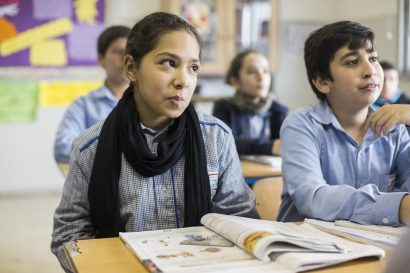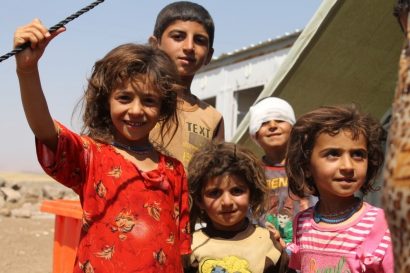Tag: refugee education
An estimated 75 million children cannot go to school because they have been driven from their homes by war, crisis, and natural disaster. This deprivation in turn destabilises vulnerable regions because uneducated children grow into at-risk teenagers and young adults. To strengthen its education in emergencies (EiE) programming, the U.K. Department of International Development (DFID)… Read more
This report tells the stories of some of the world’s six million refugee children and adolescents under UNHCR’s mandate who are of primary and secondary school-going age between 5 and 17. In addition, it looks at the educational aspirations of refugee youth eager to continue learning after secondary education. Education data on refugee enrolments and… Read more
On Human Rights Day, Ruth Naylor, co-author of our HEART topic guide on education for refugees and internally displaced persons (IDPs) in low- and middle-income countries, highlights the data gaps and challenges to addressing educational needs for this largely invisible group. Education is a fundamental human right. Legally, every individual across the world is… Read more
Joseph Munyambanza, a refugee from the DRC, started teaching fellow refugees in Uganda in his early teens, whilst studying at secondary school. In his keynote speech in Berlin, at “Education for a better future – creating prospects for displaced populations”, he described how he had joined with other refugee youth in his camp to form… Read more
This topic guide is designed to support DFID advisors, education specialists, and other partners working on providing education for refugees and Internally Displaced Persons (IDPs). It provides an overview of the key issues, and signposts relevant sources for further information and reading. Section 1 provides a brief introduction to the guide. Section 2 gives a global overview of forced displacement and education. Section 3 maps the state of research, policy, and practice in refugee education. Section 4 maps the state of research, policy, and practice in IDP education. Section 5 seeks to identify and explore best practice, and existing and potential future opportunities and innovations, in the field of education and forced displacement. Read more
The objective of this case study is to support the development of innovative and inclusive educational spaces for Calais refugees that are responsive to their needs and capacities and to the changing dynamics of the camp. Using an action research approach, this innovation aims to convert a bus into a mobile school that not only houses classrooms,… Read more
It is difficult to conceive a sustainable, long-lasting solution to the Palestinian– Israeli conflict without examining the refugee issue and identifying a just solution to it for both sides. Over time, and beside its emotional dimensions, the refugee issue has been increasingly regarded as a “problem” for the Israeli and the Palestine Liberation Organization (PLO)/Palestinian… Read more
This Brief provides basic planning and programming recommendations for managing refugee teachers, and is geared particularly towards camp settings where teachers are being recruited directly from refugee communities. The Brief is intended for anyone who is responsible for recruitment, management and/or training of teachers in refugee settings, including UNHCR, NGO, Ministry of Education or national… Read more
Over 1.1 million Syrian children have registered as refugees with UNHCR worldwide. Of this number, some 75 per cent are under the age of 12. Children represent 52 per cent of the total Syrian refugee population, which now exceeds 2.2 million. The majority live in Syria’s neighbouring countries, with Jordan and Lebanon combined hosting more… Read more
Around the world, nearly 50 million children have migrated across borders or been forcibly displaced – and this is a conservative estimate. More than half of these girls and boys fled violence and insecurity – 28 million in total. Children in these contexts are among the most vulnerable people and this vulnerability is only getting worse…. Read more
In this journal, the article, Quality Education for Refugees in Kenya: Pedagogy in Urban Nairobi and Kakuma Refugee Camp Settings, examines the quality of education available to refugees in Kenya, with a particular focus on instruction. By providing empirical data about instruction in a refugee education context, the article supports anecdotal accounts and strengthens agency-led evaluations. It… Read more







